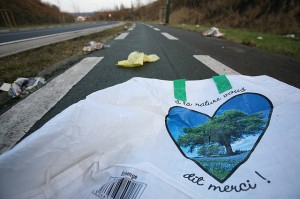Stoppt den Bau der Autobahn A4! (Stop the building of the A4 highway)
This site is a well-organized site lobbying for public support on an issue concerning the building of a new highway on the Autobahn. Of course, this site must be biased to a certain extent since it poses itself against a specific road construction plan. It presents well-documented and researched information and facts throughout, but parts are now and then written in a poetic way to inspire feelings from the reader (for instance, the description of certain forests or reservoirs the highway would cut through).
It includes many links informing one of where the road will be, which well-known and important natural areas is cuts through, and the arguments for and against the construction. The position promoting the highway is presented by the display of a list of well-documented quotes from politicians. The argument opposing the construction is illustrated with large, bold font and smaller font describing each point underneath. For instance, the imposing road would (and now does) run through “das Rothaargebrige” (a reservoir with floodplains, rare species, and important ecological significance), “der Burgwald” (a forest with an old castle and highly populated with animal species that would not be able to survive if the roads were fragmented and more humans moved into the area), and many other natural areas. Not only are environmental issues put forth, but the authors also include a few other reasons the highway would damage more than benefit the land and people through which it would run and why is it not needed.
The site did not prevent the installation of this highway, but it has added to the literature and awareness of the damage roads can pose to natural ecosystems and pristine areas.



